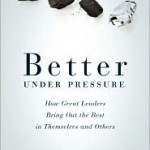 Better Under Pressure: How Great Leaders Bring Out the Best in Themselves and Others
Better Under Pressure: How Great Leaders Bring Out the Best in Themselves and Others
Justin Menkes
Harvard Business Review Press (2011)
Those who have read Justin Menkes’s previous book, Executive Intelligence, probably agree with me that it sets an exceptionally high standard in terms of brilliant insights that are eloquently expressed. Well, he has not only met but elevated that standard with this book, one in which (as its subtitle correctly indicates) he explains how great leaders bring out the best in themselves and in others. Here’s an exercise that I have conducted to begin countless workshops and seminars: Draw up a list of the world’s greatest leaders throughout history. No matter which ones are listed, each of them met those two criteria. In fact, they are defining characteristics. Menkes interviewed more than 60 CEOs from whom he has learned a great deal and then selects 25 (whom he characterizes as “representative”) to serve as a specific resource throughout his narrative.
This book responds to an especially important question: “How to realize your own potential while helping others to do so?” Moreover, helping others to do so is central to fulfill one’s one potential. “My research has shown that the best leaders work with the people they lead to seek their mutual maximum potential together: they co-create their success.” After briskly identifying the “what,” Menkes focuses most of his attention to explaining “how” and, when appropriate, “why.” His vast and rigorous research suggests that there are three traits, each of which serves as a catalyst for the development process: realistic optimism, subservience to purpose, and finding order in chaos.
I commend Menkes for including timed self-assessment exercises that are relevant to the three traits/catalysts: “Evaluating Your Level of Realistic Optimism” (Pages 52-54), “Evaluating Your Level of Subservience to Purpose” (Pages 100-103), and “Evaluating Your Ability to Find Order in Chaos” (Pages 144-145). There is a brief explanation of how to interpret responses at the conclusion of each exercise. Menkes also provides a fourth timed exercise, “States of Pressure” (Page 174) that will help the reader to perform better in stressful circumstances.
In the final chapter, Menkes explains how David Dillon (CEO of Kroger) “elucidates all three catalysts for realizing potential [his and others’] in a global economy.” Throughout the massive economic downtown in recent years, Dillon acknowledges that he was both “scared every day, almost all the time” and confident that the problems (however severe) were “just obstacles to be overcome, things to be fixed.” By example and with seamless faith, he inspired others to embrace Kroger’s commitment to “find a way to make [their customers’ lives] better.” Finally, Dillon recognized that “a gigantic shift” was occurring, obtained the data he needed to understand it, and then facilitated “his team’s triumph of Kroger’s competition.”
Early in the book (Page 39) Justin Menkes observes, “we are all a committee of selves.” Later, when concluding the book, he notes that “people do not act as isolated entities, but are reflections of an essential interaction between themselves and the context in which they are placed.”
So excited I found this atrilce as it made things much quicker!